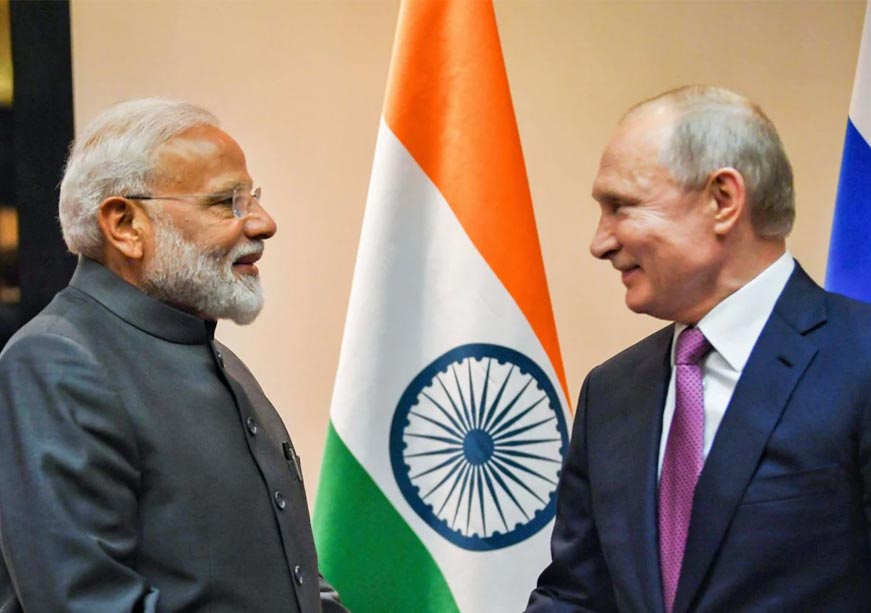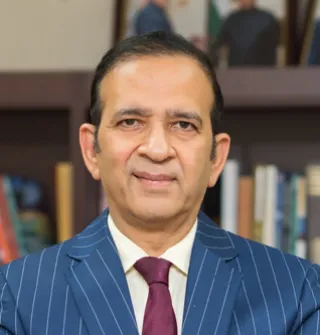-
CENTRES
Progammes & Centres
Location
Since Putin and Modi last took stock of ties, a new energy and economic relationship has emerged, driven by Russia’s war

When Modi and Putin sit for dinner in Putin’s Moscow dacha tonight, they will chew on a geopolitical and bilateral context that has changed dramatically since they broke roti together in Delhi in 2021. The Ukraine war that began in February 2022 not only delayed their meeting but has also thrown up unprecedented challenges and opportunities.
Both leaders are veterans of the annual bilateral summit, which sits at the apex of a multi-layered diplomatic architecture. Putin has attended most of the 21 summit meetings since 2000, when he signed a strategic partnership agreement with then PM Vajpayee. The adjectives ‘special and privileged’ were added in 2010 to describe ties, to reassure Russia of its continuing relevance for India in the wake of the Indo-US civil nuclear deal. For Modi, this is the eighth straight summit with Putin. Both leaders realise that given the nature of bureaucratic structures on both sides, their annual meeting is vital for troubleshooting problems and generating fresh thinking. With the gap of three years, several crucial issues have piled up on the high table.
Putin has attended most of the 21 summit meetings since 2000, when he signed a strategic partnership agreement with then PM Vajpayee.
While the ‘time-tested’ and largely state-driven relationship has robust strategic pillars –defence, nuclear, space– trade had lagged. In 2014, at their first summit meeting, Modi and Putin released a joint statement outlining their vision for strengthening ties over a decade. With trade numbers hovering under USD 10 billion then, they set an ambitious target for 2025 of USD 30 billion of trade and USD 50 billion of bilateral Investment. Trade has surged in the last couple of years to more than double the target, achieving an all-time high of around USD 66 billion (with India’s imports around USD 62 billion) in fiscal 2024, thanks to imports of discounted petroleum, fertilizers and coal. With this problem of plenty, the leaders will need to discuss ways of fixing the skewed trade balance. They will seek pathways for Russian companies to navigate western sanctions and use local currencies to invest surpluses in India, to try and reach the target of USD 50 billion of bilateral investments, from the current level of USD 33 billion.
The import of discounted petroleum deepens an energy partnership that includes the Kudankulam nuclear park, already supplying 2000 MW of energy, with 4000 MW of reactor capacity in the pipeline. Russia is the only external partner delivering nuclear energy on the ground and will offer more reactors.
The defence relationship remains crucial as India’s dependence on Russia for platforms and munitions continues. Despite the steady diversification to other defence partners like US, France, South Korea and Israel, coupled with an ambitious domestic manufacturing program. Russia still offers a competitive edge in several niches of critical defence technology. It will remain an important partner for a few more decades, given India’s purchase of platforms like the S400 air defence system, newer frigates, joint production of Brahmos missiles, a nuclear submarine programme and the requirement of spare parts for older acquisitions.
For Delhi, Moscow will remain an important strategic, defence and energy partner. India’s historical investments in the Russia relationship do not just make for a ‘legacy factor’, they are essential to sustain defence preparedness, to ensure an alternate source for energy and technology, and even to serve as a geopolitical hedge in a world between orders.
Putin met Xi twice in the last two months and, with bilateral trade over USD 240 billion, exulted that Russia-China ‘no limits’ ties were experiencing their ‘best period in history.’
Indeed, while the bilateral plate is full, geopolitics will not be checked at the door. The world has changed critically since the last summit. Russia is at war, another dangerous conflict is on in Gaza, while Chinese belligerence has not lessened. Putin met Xi twice in the last two months and, with bilateral trade over USD 240 billion, exulted that Russia-China ‘no limits’ ties were experiencing their ‘best period in history.’
For India, the single most critical strategic challenge is China’s expansionism at its borders. It will tend to look at all its relationships through that prism. The China factor makes for an additional driver for India’s engagement not just with China’s strongest global competitor, the US, but also with its closest ally, Russia. Both India and Russia recognise the other’s interest in engaging a geopolitical adversary. Russia acknowledges that the US may be a closer partner for India, just as India sees Russia’s compulsions in its tight embrace of China. Yet, India would hope that Russian influence would modulate Chinese behaviour.
The endgame of the Ukraine war will no doubt figure in the conversation, particularly in the context of Putin’s recent offer of a conditional ceasefire timed to the Swiss-Ukrainian summit which Modi did not attend. Putin has an upper hand in the war and might await Trump in the White House to push through a ceasefire deal on his own terms. And India may be the only major west-friendly democracy that can encourage, if not facilitate, Putin on the path to dialogue.
Modi and Putin have an excellent personal chemistry, growing since their first summit a decade ago. This will fuel their engagement at the start of their new terms. The Moscow meetings will be an opportunity to reaffirm faith in this enduring relationship, as Modi 3.0 navigates the complexities of a world in flux.
This commentary originally appeared in The Times of India.
The views expressed above belong to the author(s). ORF research and analyses now available on Telegram! Click here to access our curated content — blogs, longforms and interviews.

Ajay Bisaria is a Distinguished Fellow at ORF. He is also a strategic consultant and commentator on international affairs. He has had a distinguished diplomatic ...
Read More +